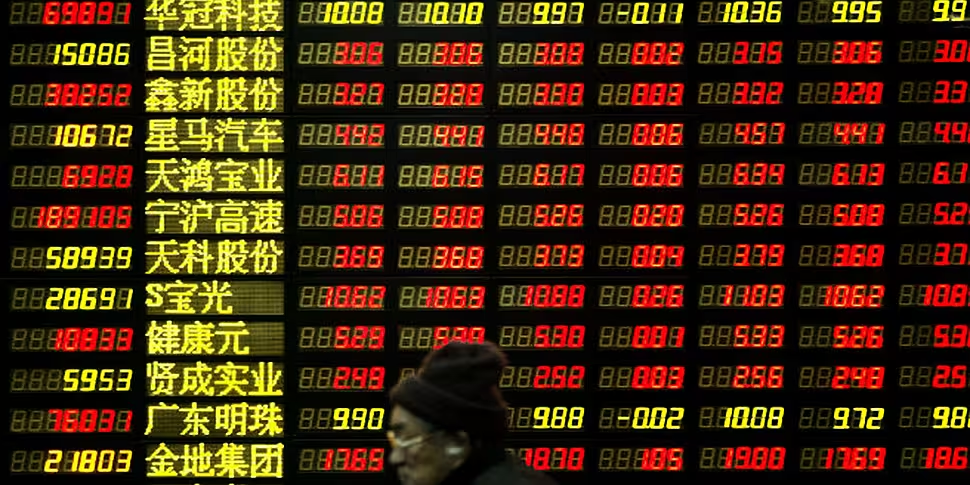The Irish Stock Exchange dropped 312 points today, as markets are hit by the impact of the economic turmoil in China.
The FTSE 100 has plunged by 4.7% - its worst day in six years - after the index was one of many around the world hit by uncertainty over the Chinese economy.
The fall of 289 points to 5899 was the biggest daily drop since 2009.
Markets around Europe and the world saw dramatic falls in response to a continued slide in China's stock markets.
The Shanghai Composite tumbled 8.5% on Monday, having lost more than 10% already this month, leaving China's top index back at the level it started the year.
The fall was exacerbated, analysts said, by a lack of further stimulus from China's central bank which many had expected over the weekend to help support the flagging economy.
In the US, the Dow Jones Index initially opened down 6% before recovering quite a lot of ground.
By 5pm, the French CAC was down 5.3% and the DAX in Frankfurt lost more than 4.7% after both suffering significant initial falls.
The FTSE 100 is home to a number of big mining firms which rely on China for a key component of their sales revenue.
If China’s global growth stutters, experts are worried the demand for commodities including oil - which is already at a six-year low - may also suffer.
US markets followed their biggest one day drop in four years on Friday by opening more than 4% down, with the S&P 500 almost 5% down.
The tech-heavy NASDAQ lost almost 8% before also recovering much of what it had lost.
Market analysts added that automatic electronic trades had contributed to the initial heavy falls as many traders continued to enjoy summer holidays.
Takako Masai, the head of research at Shinsei Bank in Tokyo, said earlier: "Markets are panicking. Things are starting look like the Asian financial crisis in the late 1990s.
"Speculators are selling assets that seem the most vulnerable."
China's slowing economy and the depreciation of the yuan as well as plunging commodity prices and fears over the timing of the next US interest rate hike have all contributed to the sell-off.
The worries have seen the FTSE 100 officially enter "correction" territory - more than 10% down from its all-time high of 7104 in April.
It lost 5.5% of its value last week alone while Monday's performance meant it achieved its tenth consecutive day of losses.
The People's Bank of China is under pressure to announce a new round of quantitative easing to boost money supply in an economy suffering weaker demand across all sectors.
The Chinese authorities have intervened numerous times to try and arrest the share sell-off - the latest measure allowing the state pension fund to invest up to 30% of its assets in Chinese stocks.
Since its peak on 12 June, the Shanghai market has lost nearly 40% or around $5.5tn of value.
While China has taken the spotlight, analysts have pointed to other fundamental factors at play in the share slide.
"On the surface it would be easy to point the finger at slowing China growth, falling oil prices and emerging market currency wars as the reason why global equity markets have fallen sharply through the summer," wrote Sean Darby, chief global equity strategist at Jeffries.
"However, a mix of disinflation and deflation forces, a tightening in global monetary conditions and deteriorating profits in emerging markets are much greater factors."
The oil price weakness is being particularly felt in Russia, where the rouble has hit a seven-month low against the dollar.
Russia's failure to diversify its economy has left it vulnerable to oil price weakness.
Markets Editor with the Sunday Business Post Ian Guider says the signals from the Chinese government have spooked the markets:









